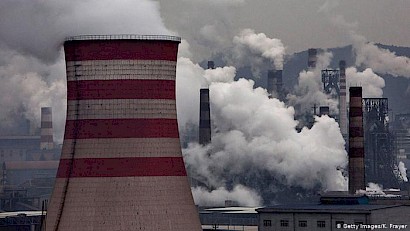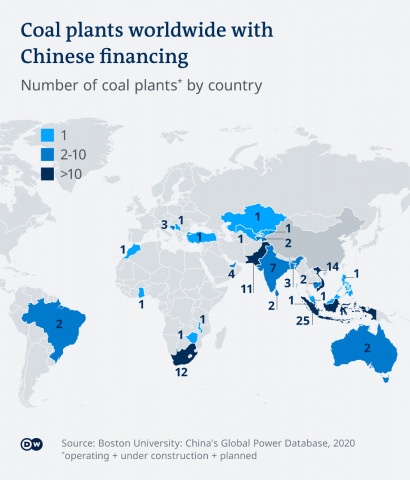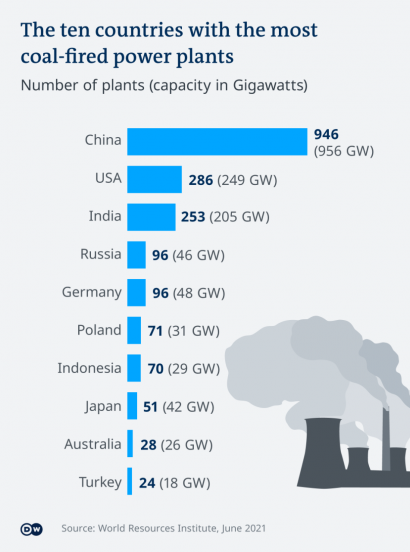China to exit coal-fired power abroad
 China gave unexpected hope in the push to decarbonize the global energy supply when President Xi Jinping committed to ending support for new coal power projects overseas.
China gave unexpected hope in the push to decarbonize the global energy supply when President Xi Jinping committed to ending support for new coal power projects overseas.
Speaking at the United Nations General Assembly in New York, Xi’s statement regarding the need to “actively respond to climate change and create a community of life for man and nature” reiterated China’s commitment to carbon neutrality by 2060 — and to peak emissions before 2030.
But the further vow to end China’s investment in overseas coal-fired power plants could be a groundbreaking moment in the leadup to the pivotal COP26 climate conference in November.
After Japan and South Korea also ended support for overseas coal projects in the last year, China was by far the world’s largest coal financer, especially in Asia where some 600 new coal plants are slated to be built.
 US climate envoy Kerry: ‘Great contribution’
US climate envoy Kerry: ‘Great contribution’
While the scope of the announcement remains vague regarding the timeline, the ending of state versus private financing, and whether existing projects will be affected, it was met with universal support by climate activists and policymakers.
“It’s an extremely welcome decision,” US climate envoy John Kerry told DW in New York as the world’s two highest emitters continue to collaborate on climate action. “I’m absolutely delighted that president Xi has made this important decision, it’s a great contribution, it’s a good beginning to the efforts we need to achieve in Glasgow,” he added, referring to the November COP26 climate summit that will address the Paris targets.
“It’s certainly a positive step forward,” said Li Shuo, Beijing-based policy adviser with Greenpeace East Asia. “It’s going to contribute to the ongoing global trend to move away from coal. It will also bring momentum to the COP26 summit.”
“China’s pledge shows that the firehose of international public financing for coal is being turned off,” said Helen Mountford, Vice President for Climate and Economics at the World Resources Institute. “China’s commitment, coming on the heels of recent pledges by South Korea and Japan, represents a historic turning point away from the world’s dirtiest fossil fuel.”
Will private investors get on board?
But even as China joins the global exodus from coal investment by nation states, the private sector continues to finance 87% of overseas coal, notes Dr. Kevin P. Gallagher, director of the Boston University Global Development Policy Center.
“Now that the world’s major governments have led by example and banned overseas coal plants, it is time for the private sector … to follow suit,” he said, adding that global climate goals will not be met if “the private sector continues to finance overseas coal while leading governments have stopped.”
WRI’s Mountford agrees that Chinese companies and banks need to “embrace this new direction, in line with the goals of the Paris Agreement.”
Lauri Myllyvirta, lead analyst at the Centre for Research on Energy and Clean Air, believes the announcement will be an immediate disincentive to private investors.
 “This high-level statement makes it immediately clear that making any new financing or equity investment commitments to coal power projects overseas would be toxic for any Chinese bank or power company,” she said. “For projects that haven’t yet achieved financial close, that’s likely to be the end of the story.” It will mean that planned projects in Vietnam, Bangladesh and Indonesia will struggle to be realized.
“This high-level statement makes it immediately clear that making any new financing or equity investment commitments to coal power projects overseas would be toxic for any Chinese bank or power company,” she said. “For projects that haven’t yet achieved financial close, that’s likely to be the end of the story.” It will mean that planned projects in Vietnam, Bangladesh and Indonesia will struggle to be realized.
Indeed, Chinese mineral resources giant Tsingshan has already stated in the wake of the statement that it will stop building coal power plants in Indonesia — China’s largest overseas coal market — and other overseas markets.
Tom Baxter, China energy analyst and climate author for China Dialogue, noted in a Tweet that the company stated that its decision to end coal investment “will proactively implement the spirit of the important speech of Chairman Xi Jinping.”
China’s domestic coal emissions far higher
While welcome, the overseas coal announcement does not address the elephant in the room: Domestic coal-fired power output is around 10 times higher than China’s foreign coal projects — or 1,200 GW capacity within China versus under 100GW abroad, according to Li Shuo of Greenpeace East Asia.
Domestic emissions are a “much bigger problem” that are yet to be addressed, said Shuo.
Yet he is hopeful that that the announcement from the Chinese leader will lead to “more progress on the domestic front,” especially combined with Xi’s commitment to fund green and low-carbon energy abroad.
“This announcement is a strong sign of coal’s global collapse,” said Durand D’Souza, data scientist at Carbon Tracker. “However, China could go further and also focus its efforts internally by cancelling its plans to build 163GW of new coal. Now is the time for China to move away from being the largest coal power producer and continue its shift to lower cost renewables.”
You can return to the main Market News page, or press the Back button on your browser.

